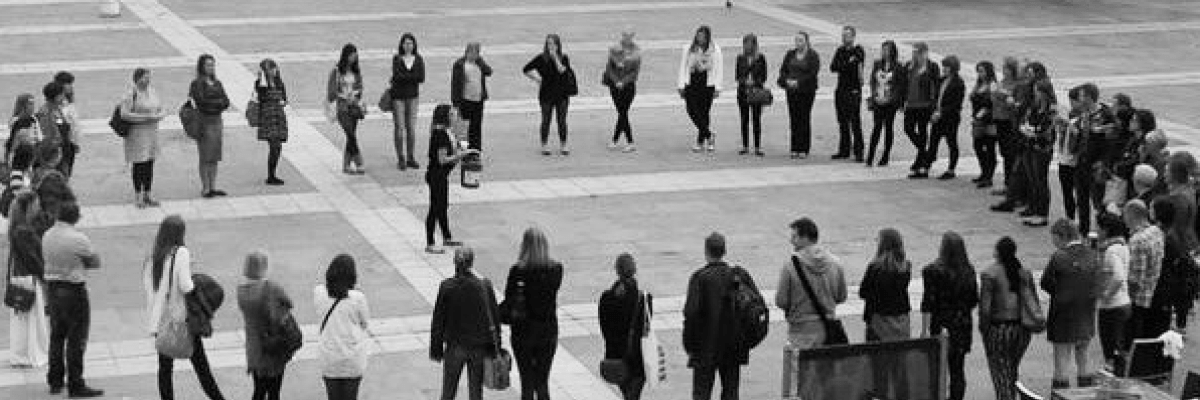On the evening of 14 September 2016, Iriss (Michelle, Kerry and Lisa) took part in an iamsocialwork event in Glasgow. iamsocialwork is a concept created by Zoe Betts, a qualified social worker, to provide peer support and networking for student, newly qualified and qualified social workers across the UK. iamsocialwork involves a series of SUPER:vision events that bring social workers together to share experiences, knowledge and challenges and to provide a listening ear and support to each other.
We went along to run a workshop on The View from Here project, which explores the experiences of the social services workforce. We were hoping to prompt some interesting discussion and our expectations were exceeded. We weren’t disappointed with the food either! Zoe had laid on some tasty pizza to get the discussions going.
We had two provocations…
A poem written by Scott Glasgow, a newly qualified social worker, an excerpt of which is below:
On one hand I want to help, yet I’m set to delve
Some people are left on the shelve, others I’m allowed to help
The deserving or undeserving
The seen and unseen
The spoken and unspoken
The written and unwritten
Always politics are interwoven
A letter written by a care worker exploring the highs and lows of the job, a snippet of which is below:
“...people don’t really think about care and support until it becomes a part of their life. I wish that people would think of care and support in the same way they think of health services, just an inevitable part of being alive. But, the invisible network of support services that weave in and out of people’s lives seems to be much more stigmatised….."
'...I would love people to know how much working in care has shaped who I am now. The nature and privilege of this work is that you are able to be part of other people’s worlds; you learn their habits and secrets and routines. But at the same time, they also become part of your little world.”
Reflections from social workers
After listening to the provocations, we facilitated the discussion between those who were gathered at the event. Here are some of the themes:
Need for self-care
We’d heard a presentation from a care experienced person who had advocated that social workers must take care of themselves if they’ve to take care of others. We found little evidence of self care in the profession - the focus always reverted back to the person being supported. Similarly, we heard reports that it was much more common to ‘defend/hold the position’ rather than to look after each other. This spoke to a broader blame culture evidenced in every group, with some individuals stating, 'if you are a teacher or doctor you’d get support from your superiors, but if your are a social worker you are immediately under investigation, and hung out to dry', all indicating that for many the stakes feel very high.
Trauma
There was broad discussion about ‘vicarious trauma’ which is trauma that results from empathic engagement with those who are traumatised. Some said that they’d become desensitised in the process, while others stated that ‘we’re human too’ and felt that more support was necessary. Again, the difference between the experiences of social workers and other types of public sector workers were highlighted, with those present highlighting that some employers visibly try to discourage threats to their staff e.g. you see signs like 'verbal abuse will not be tolerated' in train stations and hospitals, while this type of behaviour and language is seen as an integral part of the job that social workers just have to deal with. We discussed how there is much less public knowledge about these elements of the role.
Perceptions
The practitioners in the group perceived that they often had less status and less public support in comparison to other professionals in fields such as health or education. They also felt a lack of control around shaping this perception. While recognising the need to further assert and advocate for their role, it was articulated that that’s not why they got into the job, and they’d prefer to get on with ‘the work’, the day job always taking priority.
Identity
The group felt that there weren’t that many people to advocate or speak on their behalf. They observed that while they fight for social justice for others, they rarely fought for justice for themselves. They wanted the voice of social workers to be presented in an authentic way - by social workers themselves, and not by individuals from umbrella organisations who may not a background in the profession. It was difficult to gauge desire, capacity and capability to shape perceptions of social services, but some agreed that support to share their views is required.
Overall, being exposed to others’ experiences through the session seemed to validate people’s perspectives. We ended the session by asking some of the groups 'what do you wish that the public knew about your role/job?'. Here is a taste of their responses:
“I love my job”
“We’ve got power but not as much as you think I have!”
“We actually try to keep families together”
“Social workers are people too”
“I’m not here to look over your shoulder, i’m trying to make things better”
My View
Make your views heard. We've set up a letter campaign - My View - where we're encouraging practitioners to communicate to the public 'things I wish you knew about my job'. Write a letter to the Scottish public and help inform them of what it means to work in social services. With your permission we will publish the letters online and possibly use them as part of our public exhibitions. Get in touch if you have any questions.

